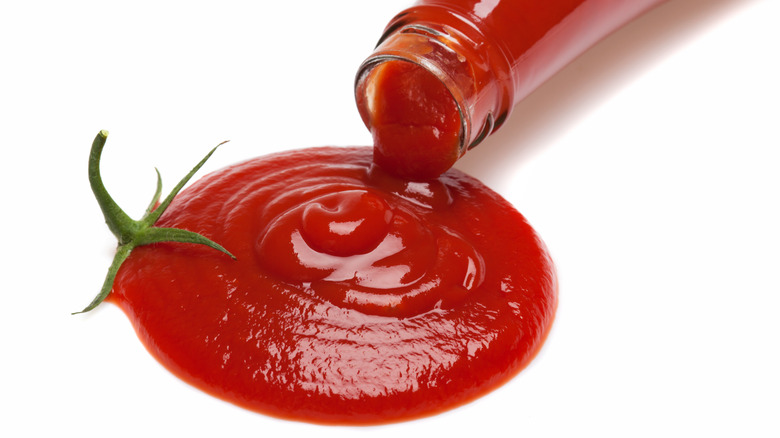Is There Any Difference Between Ketchup And Catsup?
Most people agree that the savory, tomato-based condiment popular on fries, burgers, hot dogs, eggs, and a massive selection of other dishes is as delicious as it is versatile. What they can't agree on is exactly how to spell it — "ketchup" or "catsup." It's enough to make even experienced cooks wonder if there's a difference between the two sauces. Fortunately, the answer is clear.
Regardless of how it's spelled, ketchup and catsup typically refer to the exact same thing, with only relatively minimal differences from brand to brand along the lines of other common condiments. The difference can be traced to the origins of the sauce itself, which has roots stretching back to Western traders who sailed to the Far East in the 17th century. Although the precise sauce it's based on isn't known, several similar Chinese and Malay words for the sauce include "ke-chiap," "kicap," "kecap," and "ketjapit," which is likely how it became known in England as "catchup."
Initially heavy on items like anchovies, shallots, and spices, it eventually evolved in the United States to include the more familiar, tomato-based way of how ketchup is made by the early 1800s. Still, it was commonly found sold as both catsup (a spelling popularized by a 1730 Jonathan Swift poem) and ketchup.
Ketchup comes to dominate
The now-common spelling of "ketchup" only became the clear leader as the popularity of Heinz's version soared in popularity in the late 19th century. However, those who run across brands or menus that still use the "catsup" spelling can rest assured they'll be receiving the same condiment they're used to.
It should be little surprise that the "ketchup" spelling came to dominate, as Heinz is the clear leader when it comes to sales of the condiment in the United States — even if it only came in third on Mashed's list of 11 ketchup brands, ranked worst to best. Most other brands, looking to piggyback on Heinz's success, switched to using the same spelling, leading to today's largely standardized usage.
So, whether you're buying it at the supermarket, enjoying it at a restaurant or fast food chain, or even making your own homemade ketchup recipe, forget about the spelling and focus on that beloved flavor instead.

